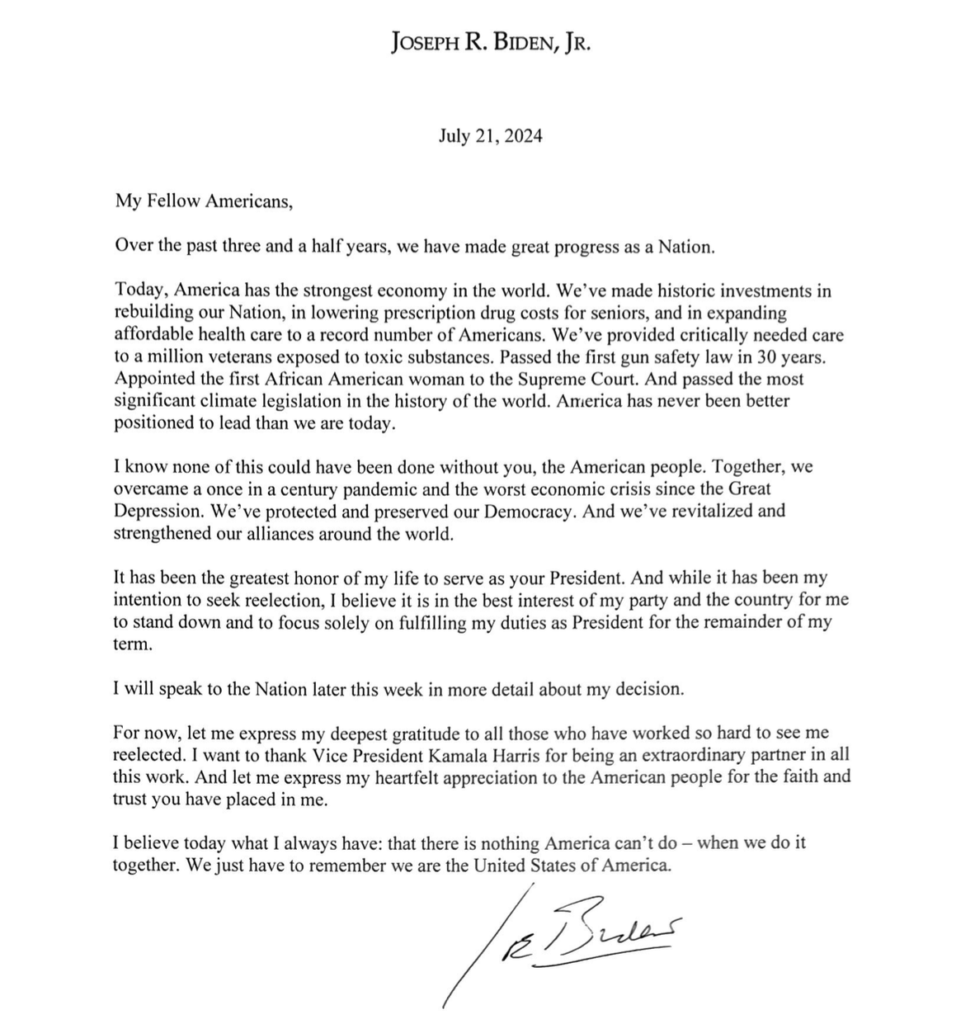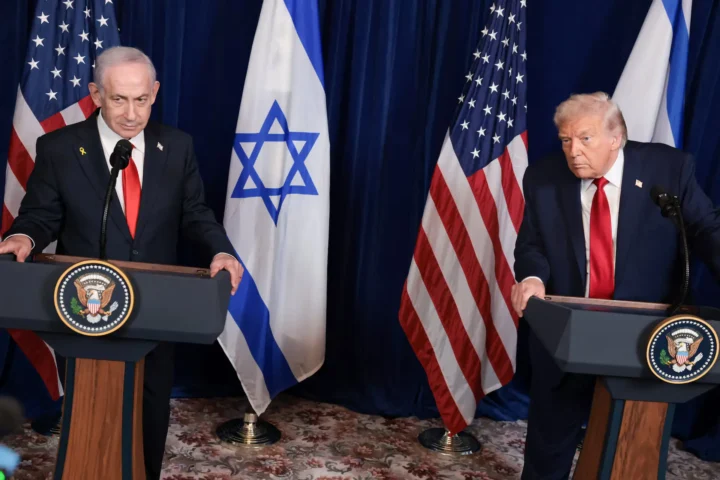In an unprecedented move that echoes through the annals of American political history, President Joe Biden took one of the most consequential steps imaginable on Sunday: he ended his bid for a second term. After more than half a century of admirable public service, relinquishing power wasn’t easy. It required a push from the Democratic establishment but also a measure of self-awareness that is too often absent from U.S. politics.
“I believe it is in the best interest of my party and the country for me to stand down,” Mr. Biden wrote in an open letter. The president offered his “full support and endorsement” for Vice President Kamala Harris to replace him as the nominee. He said he will address the nation “later this week in more detail.”

Mr. Biden campaigned in 2020 as a “bridge” to the next generation of Democratic leaders. Passing the torch now — four years earlier than he had hoped — increases the odds that his party can hold the White House. But Democrats need to proceed carefully.
Vice President Harris is the heavy favorite to emerge as the party’s standard-bearer at the Democratic National Convention in Chicago next month. Delegates might not want to deny the nomination to the first female vice president. That’s why many potential top-tier contenders have signaled they will not challenge her.
Yet, an open process for picking Mr. Biden’s replacement as the Democratic nominee, as well as that person’s running mate, risks becoming messy. It could draw attention to Democratic quarrels over divisive issues such as Mr. Biden’s policy in the Middle East. The Democratic convention was already shaping up to be contentious before Mr. Biden’s exit, with the possibility of large protests outside the venue.
However, Mr. Biden’s decision creates an opportunity for a reset, not only for his party but also for U.S. politics generally, through a competitive nomination process among future national leaders. Barack Obama was a stronger candidate in 2008, and maybe even a better president, because Hillary Clinton competed so fiercely with him during a marathon primary season. Though this sort of vetting process isn’t replicable, there is time for Democrats to scrutinize the contenders for the top of the ticket.
The logistics of a compressed nominating contest would not necessarily be hard. France just held snap elections without a hitch. All the delegates and superdelegates are already selected and set to convene in Chicago. Democrats would not even have to schedule primaries: Debates among the top contenders would suffice.
Polls show Vice President Harris is the best known among the potential Democratic nominees, but, by the same token, she has a record in the Biden administration — including her validation of Mr. Biden’s fitness for a second term — that people have a right to examine. She did not succeed in addressing the root causes of illegal immigration, an assignment the president gave her, but she excelled as a messenger decrying the Supreme Court’s decision overturning Roe v. Wade.
Perhaps more important, she is not the only option. Governors such as Michigan’s Gretchen Whitmer, North Carolina’s Roy Cooper, and Kentucky’s Andy Beshear have also been mentioned. Two Democratic governors elected in 2022 could have bright futures on the national stage: Maryland’s Wes Moore and Pennsylvania’s Josh Shapiro. Talented Cabinet secretaries like Commerce’s Gina Raimondo and Transportation’s Pete Buttigieg, as well as Senators like Arizona’s Mark Kelly and Colorado’s Michael Bennet, also offer formidable choices.
At each decision point, Democrats should err on the side of transparency. Even if Vice President Harris quickly locks down the nomination, her running mate should still be decided at the convention. State delegations and superdelegates could play a vital role during nationally televised proceedings that would grip the country and shine a spotlight on the Democratic Party.
Even though he’s not seeking another term, Mr. Biden can still help his party campaign against GOP nominee Donald Trump this fall. By far his most important assignment now, though, is to work on getting the country in the best possible shape for his successor. Unburdened from the rigors of the campaign trail, Mr. Biden can help bring a long-sought conclusion to the war in Gaza and secure the release of hostages, as well as pilot the U.S. economy to a soft landing from inflation that will be made likelier if the Federal Reserve cuts interest rates.
The United States just celebrated the Fourth of July for the 248th time. Mr. Biden has been alive for nearly one-third of that history. His prudent, selfless decision to stand down improves his party’s prospects today, and, undoubtedly, retrospective assessments of his presidency tomorrow.
In an era often marred by political infighting and partisan gridlock, President Biden’s act of stepping aside sets a new precedent in American politics — one of selflessness, foresight, and dedication to the greater good. It is a move that demands respect and one that will surely shape the future of the Democratic Party and the nation.











